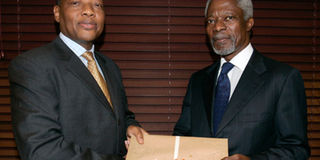Hague: Annan's deadline for Kenya leaders

Former UN secretary general Kofi Annan (right) receives a sealed envelope with a report on Kenya's post election violence in 2007 from Justice Philip Waki, head of the Commission of Inquiry into the Post Election Violence. He has warned Kenya that it has ten weeks to form a local tribunal or send suspects' names to The Hague. Photo/FILE
What you need to know:
- Former UN secretary general Kofi Annan has told BBC’s Network Africa that he has given President Kibaki and Prime Minister Raila Odinga up to the end of August to have the tribunal put in place.
- An attempt to establish the tribunal was defeated in Parliament after MPs voted against it.
- ICC has warned it will act fast to bring perpetrators to justice.
The Kenya Government has ten weeks to form a local tribunal to try last year’s post election violence suspects or have their names sent to The International Criminal Court.
Former UN secretary general Kofi Annan has told BBC’s Network Africa that he has given President Kibaki and Prime Minister Raila Odinga up to the end of August to have the tribunal put in place.
“If it is not established within a reasonable period in this case towards the end of August, I will have no option but to hand over the envelope to the ICC to take over from there,” Mr Annan said.
Mr Annan, who mediated the Kenyan post-election conflict, said that he was in touch with the two principals and they had promised to make a second attempt to form the tribunal.
An attempt to establish the tribunal was defeated in Parliament after MPs voted against it.
The government has charged the Permanent Committee on the Management of the Grand Coalition with the responsibility of coming up with ways of reintroducing the bill seeking to establish the special tribunal.
While opening the current session of Parliament in April, President Kibaki submitted that it was better to try the key suspects of post-poll violence at home.
“The government will expand consultations with a view to reformulating the establishment of a local tribunal to try the perpetrators of the post-election violence,” he said.
The International Criminal Court has already warned it will act swiftly on the Kenyan case if Parliament fails to establish a local tribunal.
ICC’s intervention, warned a special advisor to chief prosecutor Louis Moreno-Ocampo, will be relentless, firm and unstoppable.
Ms Beatrice le Fraper Du Hellen told the Nation in April The Hague started collecting information on the crimes against humanity after the 2007 elections in December and will not take long to issue warrants of arrest to suspected architects of the violence once it takes up the case.
Mr Annan told the BBC that it is in the interest of Kenya that the suspects are tried locally. He added that Kenyans will be better off if the trials are held on home soil noting that failure to do so will be a big blow to the fight against impunity.
“But it is not for the leaders alone. Members of Parliament have a responsibility to those who voted for them. They should not hide behind their leaders as if they are not responsible,” Mr Annan said.




